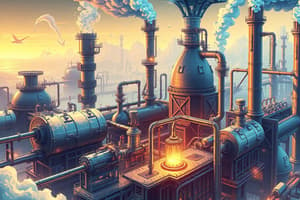Podcast
Questions and Answers
What is the Alkali Act?
What is the Alkali Act?
The 1st modern air pollution legislation.
Who is known as the 'Father of Chemical Engineering'?
Who is known as the 'Father of Chemical Engineering'?
- Lewis Mills Norton
- Arthur D. Little
- George Davis (correct)
- Margaret Hutchinson Rousseau
The Solvay Process was formulated by Ernest Solvay in 1863.
The Solvay Process was formulated by Ernest Solvay in 1863.
True (A)
Match the following chemical engineers with their contributions:
Match the following chemical engineers with their contributions:
What was the Haber-Bosch Process used for?
What was the Haber-Bosch Process used for?
Sodium carbonate is a vital chemical in the ______ industries.
Sodium carbonate is a vital chemical in the ______ industries.
Who was the first woman with a doctorate degree in chemical engineering?
Who was the first woman with a doctorate degree in chemical engineering?
Nicholas Leblanc patented a method for producing Na2CO3 from sea brine.
Nicholas Leblanc patented a method for producing Na2CO3 from sea brine.
Which chemical was traditionally sourced from wood ashes, contributing to massive deforestation?
Which chemical was traditionally sourced from wood ashes, contributing to massive deforestation?
What were two of the first industrial chemicals produced during the Industrial Revolution?
What were two of the first industrial chemicals produced during the Industrial Revolution?
Study Notes
Chemical Engineering
-
AIChE defines Chemical Engineering as a profession that uses knowledge from mathematics, chemistry, and other natural sciences to create economical ways to use materials and energy for the benefit of mankind.
-
American Heritage Dictionary defines Chemical Engineering as a branch of engineering that focuses on the technology of large-scale chemical production and the manufacture of products through chemical processes.
-
Columbia Encyclopedia defines Chemical Engineering as the field of engineering that involves designing, constructing, and operating plants and machinery for large-scale production of materials like acids, dyes, drugs, plastics, and synthetic rubber. Chemical engineers must be skilled in both chemistry and mechanical engineering.
History of Chemical Engineering
-
Before the 1880s, Chemical engineering was a mixture of disciplines:
- Mechanical engineering with some knowledge of chemical process equipment
- Applied chemistry with knowledge of large-scale industrial chemical reactions
- Chemical plant foremen with extensive experience but limited formal education
-
The Industrial Revolution (18th to 19th Century) saw the rise of industrial chemicals like:
- Sodium carbonate (soda ash), historically sourced from wood ashes, leading to deforestation.
- Sulfuric acid (oil of vitriol).
-
Nicholas Leblanc patented a method in 1791 for producing sodium carbonate (Na2CO3) from sea brine, NaCl (Leblanc Process). This process had significant disadvantages, including:
- Toxic HCl release into the atmosphere
- CaS waste producing H2S
-
The Alkali Act was the first modern air pollution legislation, introduced in 1863.
-
Ernest Solvay devised a new method for producing sodium carbonate in 1863, known as the Solvay Process.
Chemical Engineers that Shaped the World
-
George Davis is considered “The Father of Chemical Engineering”.
- In 1887, he organized 12 lectures at the Manchester Technical School on Chemical Engineering.
- In 1880, he founded the “Society of Chemical Engineers”, which was initially rejected.
-
Arthur D. Little coined the term “unit operations” to differentiate Chemical Engineering from other disciplines.
- He is considered the “American Father of Chemical Engineering”.
-
Lewis Mills Norton, a Chemistry Professor at MIT, established the first 4-year bachelor’s program in chemical engineering (called "Course X").
- Course X combined elements of mechanical engineering and industrial chemistry.
-
William Page Bryant was the first student to graduate from Course X in 1888, becoming the first formal chemical engineer.
-
Carl Bosch developed the “Haber-Bosch Process”, a groundbreaking industrial chemical process that:
- Enabled the economical mass synthesis of ammonia (NH3) from nitrogen (N2) and hydrogen (H2).
- Utilized extremely high pressures (200-400 atm) and high temperatures (400-650 °C).
- Solved the shortage of fixed nitrogen, replacing Chilean saltpeter as the primary source of nitrates.
-
Margaret Hutchinson Rousseau designed the first commercial penicillin plant.
- She was the first woman to earn a doctorate degree in Chemical Engineering.
Studying That Suits You
Use AI to generate personalized quizzes and flashcards to suit your learning preferences.
Related Documents
Description
This quiz explores the field of Chemical Engineering, defining its role and significance in utilizing materials and energy. It also provides historical context and the evolution of the discipline, along with core knowledge needed for success in the profession.



